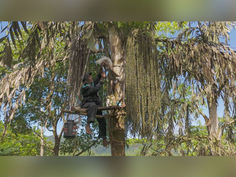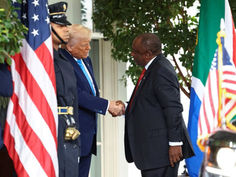A Widening Rift in the Great Lakes Region
- Prof. Simranjit Singh

- Jan 28, 2025
- 4 min read
Updated: May 14, 2025
Simran S Kaler, The Editorial Board
Prof. Simran S Kaler is Editor in Chief of The Editorial Board at Jadetimes

The conflict between the Democratic Republic of the Congo (DRC) and Rwanda is not a new tale, but its resurgence since 2022 has reignited fears of a crisis that could spiral into a regional catastrophe. As editor-in-chief of Jadetimes, I find it imperative to draw attention to a crisis that impacts millions of lives in the Great Lakes region, perpetuates cycles of violence, and challenges the international community to act with resolve.
At the heart of this escalating tension lies a complex history—a tragic tale of colonialism, ethnic divisions, and a resource-rich region plagued by governance failures and external exploitation. While the wounds of the past remain unhealed, the current conflict has become an urgent test of regional diplomacy, leadership, and humanity.
A Historical Burden That Refuses to Fade
The seeds of the DRC–Rwanda tensions were sown decades ago, during and after the Rwandan Genocide of 1994. As Hutu militias fled into eastern Congo to escape justice, their presence destabilized the region and provoked repeated military interventions by Rwanda. These incursions, while framed as security measures, often coincided with allegations of resource exploitation.
Eastern Congo, endowed with immense natural wealth, has become a battleground for armed groups, many of which thrive on exploiting the area’s mineral riches. The conflict between the Congolese government and the March 23 Movement (M23) rebels, now a central factor in the crisis, underscores the failure of earlier peace agreements and the fragility of governance in the DRC.
The M23's resurgence since 2021, coupled with allegations of Rwandan support, has poured fuel on a fire that has burned for far too long. Kigali denies involvement with the group but continues to cite security threats posed by Hutu militias based in Congo.
The Human Cost of Inaction
Lost in the haze of political accusations and military posturing are the millions of people caught in the crossfire. Entire communities have been uprooted as fighting rages in eastern Congo, with displaced families crammed into camps that lack basic amenities. The specter of starvation, disease, and violence haunts these camps, making survival a daily struggle.
Reports of mass killings, sexual violence, and child soldier recruitment paint a grim picture of human suffering that has become synonymous with the DRC's eastern provinces. It is a humanitarian catastrophe of staggering proportions, and yet, global attention remains fleeting and fragmented.
Regional Diplomacy in Crisis
The failure of diplomacy is evident in the region's inability to curb the conflict. The East African Community (EAC) deployed a regional force to stabilize eastern Congo, but internal disagreements and logistical issues have rendered it largely ineffective. High-profile meetings between Congolese President Félix Tshisekedi and Rwandan President Paul Kagame have produced little more than photo opportunities, as mutual distrust continues to undermine meaningful progress.
The international community’s response, though vocal in condemnation, has lacked the urgency required to stem the crisis. While the United Nations and major powers call for restraint, the effectiveness of existing mechanisms like the United Nations Organization Stabilization Mission in the Democratic Republic of the Congo (MONUSCO) has been called into question repeatedly.
A Broader Reflection of African Politics
The DRC–Rwanda tensions are emblematic of larger issues in African geopolitics. Weak governance, porous borders, and ethnic divisions create fertile ground for conflict, while external actors exploit the region’s resources with impunity. Nations like Rwanda and Uganda are often accused of extracting mineral wealth from eastern Congo, a claim that underscores the exploitation of African resources by not only global powers but also neighboring states.
It is time for African leaders to confront the systemic issues that perpetuate instability. Regional organizations like the African Union must step up, not as passive mediators, but as proactive agents for peace and accountability.
Charting a Path Forward
While the challenges may seem insurmountable, solutions do exist—if only the political will to implement them can be mustered. Here are three key imperatives:
1. Address Root Causes: The international community must go beyond temporary ceasefires and focus on the structural problems fueling the conflict. This means investing in disarmament programs, addressing ethnic tensions, and promoting inclusive governance in the DRC.
2. Strengthen Regional Institutions: The EAC and the African Union must take stronger, unified stances to mediate conflicts and ensure the enforcement of peace agreements. Regional cooperation is the only way to combat cross-border threats effectively.
3. Hold Perpetrators Accountable: Armed groups and their backers must face justice. Whether through international tribunals or local mechanisms, impunity cannot continue to shield those who profit from the suffering of civilians.
A Call to Action
The DRC–Rwanda crisis is a stark reminder that peace in the Great Lakes region cannot be achieved through complacency. It requires bold leadership, both within Africa and from the international community.
The people of eastern Congo deserve more than sympathy; they deserve action. As human beings, we cannot turn a blind eye to their suffering. The region’s future depends on dismantling the cycle of violence and creating an environment where prosperity replaces conflict.
The world must act now—not tomorrow, not next year. History will judge us by what we choose to do today.











































History will judge us by what we choose to do today!! Such powerful ending remarks on a very insightful analysis 👏